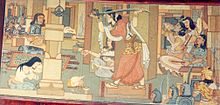- Rani Durgavati
-
Rani Durgavati (October 5, 1524 – June 24, 1564) was born in the family of Rajput Chandel Emperor Keerat Rai. She was born at the fort of Kalanjar (Banda, Uttar Pradesh). The Chandel dynasty is known for the defence of King Vidyadhar who repulsed the Muslim attacks of Mahmud Ghaznavi. Keerat Rai's love for sculpture is shown in the temples of Khajuraho and Kalanjar fort. Rani Durgavati's achievements further enhanced the glory of her ancestral tradition of courage and patronage of the arts. In 1542, she was married to Dalpat Shah, the eldest son of king Sangram Shah of the Gond dynasty. The Chandel and Gond dynasties became closer as a consequence of this marriage and was the reason Keerat Rai got the help of the Gonds and his son-in-law Dalpat Shah at the time of the Muslim invasion of Sher Shah Suri in which Sher Shah died.
Rani Durgavati gave birth to a son in 1545 CE, who was named Vir Narayan. Dalpat Shah died in about 1550 CE. As Vir Narayan was too young at that time, Durgavati took the reins of the Gond kingdom in her hands. Deewan or Prime Minister Beohar Adhar Simha kayastha and minister Man Thakur helped the Rani in looking after the administration successfully and effectively. Durgavati moved her capital to Chauragarh in place of Singaurgarh. This was a fort of strategic importance situated on the Satpura hill range.
After the death of Sher Shah, Sujat Khan captured the Malwa zone and was succeeded by his son Baz Bahadur in 1556 CE. After ascending to the throne, he attacked Rani Durgavati but the attack was repulsed with heavy losses to his army. This defeat effectively silenced Baz Bahadur and the victory brought name and fame for Rani Durgavati.
In the year 1562 Akbar vanquished the Malwa ruler Baz Bahadur and annexed the Malwa under Mughal dominion. Consequently, the state boundary of Durgavati touched the Mughal Sultanate.
Durgavati's contemporary was a Mughal General, Khwaja Abdul Majid Asaf Khan, an ambitious man who vanquished Ramchandra, the ruler of Rewa. The prosperity of Rani Durgavati's state lured him and he invaded after taking permission from Mughal emperor Akbar.
When Durgavati heard about the attack by Asaf Khan she decided to defend her kingdom with all her might although her Deewan Beohar Adhar Simha pointed out the strength of the Mughal forces. Rani maintained that it was better to die respectably than to live a disgraceful life.
To fight a defensive battle, she went to Narrai, situated between a hilly range on one side and two rivers Gaur and Narmada on the other side. It was an unequal battle with trained soldiers and modern weapons in multitude on one side and a few untrained soldiers with old weapons on the other side. Her Faujdar Arjun Das was killed in the battle and Durgavati decided to lead the defence herself. As the enemy entered the valley, the soldiers of Durgavati attacked them. Both sides lost some men but Durgavati was victorious. She chased the Mughal army and came out of the valley.
At this stage Durgavati reviewed her strategy with her counselors. She wanted to attack the enemy in the night to enfeeble them but her lieutenants did not accept her suggestion. By next morning Asaf Khan had summoned big guns. Durgavati rode on her elephant Sarman and came for the battle. Her son Vir Narayan also took part in this battle. He forced Mughal army to move back three times but at last he got wounded and had to retire to a safe place. In the course of battle Durgavati also got injured near her ear with an arrow. Another arrow pierced her neck and she lost consciousness. On regaining consciousness she perceived that defeat was imminent. Her Mahout advised her to leave the battlefield but she refused and took out her dagger and killed herself on June 24, 1564. Her death is celebrated in India as a "martyrdom day" on June 24. In the year 1983, the Government of Madhya Pradesh renamed the University of Jabalpur as Rani Durgavati Vishwavidyalaya in her memory. The Government of India paid its tribute to her by issuing a postal-stamp commemorating her death, on 24 June 1988.
Categories:- 1524 births
- 1564 deaths
- History of Madhya Pradesh
- People from Madhya Pradesh
- Indian military personnel who committed suicide
- Indian women in war
- Royalty who committed suicide
- Regents of India
- Female regents
- Women in 16th-century warfare
- People from Banda
- Indian female royalty
- 16th-century Indian people
- 16th-century female rulers
Wikimedia Foundation. 2010.

